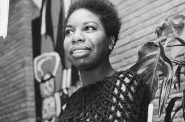Gorge, Covet, Spend
Tonight, thousands of Oprah’s Book Club members will flock to theaters in the hopes that Julia Roberts will give their middle years more meaning and help them to unlock that special orb of potential enlightenment that glows within us all.
I’m talking about Eat, Pray, Love, the best-selling cash cow memoir by Elizabeth Gilbert, whose film adaptation opens in theaters today, starring the Pretty Woman as Gilbert.
If you haven’t read it, I’ll shed some light. Gilbert is a magazine writer working in Manhattan. She is married to an equally successful man and living between a beautiful home upstate New York and a tony apartment in the city. But she’s not happy, feeling suffocated by her marital obligations and the need to reconnect with herself and… whatever.
That’s when God (yep, big G) speaks to her and gives her license to embark on a decidedly self-centered journey for inner peace. Stay with me.
After a costly divorce and a destructive whirlwind rebound relationship, Gilbert sets out on a three-part vacation across Italy, India and Indonesia, funded by a handsome advance from her publisher, to nourish her body and soul and help her find the Divine in her everyday life. For a year she stuffs her face with pizza in Naples, “meditates” in a remote ashram in India and makes it with a Brazilian gentleman in Bali.
Life is so, so hard.
Interspersed throughout, and in short paragraphs, Gilbert articulates what yogis, monks and gurus have spent a thousand lifetimes searching for, and what many have yet to attain. Somehow, even in her self-serving pursuits (and they are all highly narcissistic), after a few weeks of meditation in India (where she admits she spent more time talking about her failed relationships than actually meditating) she — get ready for this — “finds herself transported to God’s palm.”
What?
Eat, Pray, Love is a decidedly cloying tale about a very wealthy, very affluent, very white woman’s extravagant and wordy quest for self-confidence. Gilbert is an eloquent and funny writer, and at times even relatable in the broad-stroke-experiences-way, i.e., feeling like shit when you end a relationship, being out of place in a different country, etc. That said, her background, her present-day life and this fantastical cross-continental pilgrimage are so esoteric that they in no way represent most women.
And yet, women across the country — women whose most luxurious experiences involve a Sandals resort (there’s nothing wrong with that) are eating it up like low-cal yogurt. Somehow, most likely due to Gilbert’s gift for coming off like your richer, more refined best friend who doesn’t really look down on you and Oprah’s insistent shilling, it’s become a how-to guide for personal exploration and discovery.
 This all fits nicely with with Oprah’s one-woman campaign to brainwash women into “living their best life” which, translated, means to purchase Oprah-approved products like pillow shams and spa weekends and chrome plated salad spinners, neatly quantifying the price of happiness. The glaring omission, of course, is that Oprah has an amazing life because she’s worth more money than her viewers will make in a lifetime… collectively.
This all fits nicely with with Oprah’s one-woman campaign to brainwash women into “living their best life” which, translated, means to purchase Oprah-approved products like pillow shams and spa weekends and chrome plated salad spinners, neatly quantifying the price of happiness. The glaring omission, of course, is that Oprah has an amazing life because she’s worth more money than her viewers will make in a lifetime… collectively.
In Oprah’s world, there is a notion that “living better” or attaining inner peace is somehow achievable through consumption, an idea exacerbated by the film and its glossy, hyper-attractive, sun-kissed portrayal of the main character’s already-fetishized account of her own experiences.
Elizabeth Gilbert had the extreme fortune to travel the globe, staying in posh townhouses and out-of-the-way ashrams because she had the money to do so and a cavalcade of wealthy friends and family members to fall back on if she didn’t. But no matter how many anecdotes about all-carb diets and their relation to pants size, or sex (or the lack thereof) or bladder infections, the bottom line is that this is not your average woman, and her “search for divinity” has little more real depth than a drop-in hatha yoga class.
This superficiality isn’t driven by Ms. Gilbert’s affluence or life station, but by her own oversimplification of life’s weightiest ideas. And to be fair, it’s unlikely she set out to write an everywoman’s guide to personal enlightenment. But her life circumstances become significant when her experiences are being marketed as universal truths.
Just as troubling is the fervor over Eat, Pray, Love and the imitation it has bred — thousands of middle-aged women in gauzy frocks have overtaken the small town in Bali where Gilbert stayed, shacked up in posh guesthouses and bent over their laptops as they write their own memoirs about how hard life is for women of a certain age. The very notion of buying enlightenment from one’s travel agent demonstrates a key problem with how Eastern religion and medicine are continuously compartmentalized by Western culture.
Eat, Pray, Love has created a craving among the acolytes of privileged women like Gilbert (and Oprah), and reinforced that the surest way to satiate that craving is through your wallet. The film, replete with Julia Roberts’ toothy grin and contrived affability, will spawn a whole new breed of New-Age hangers-on, dripping in chunky jewelery, empty Moleskines in hand.
Quick survey: If you had to guess, how many “yoga retreats” to exotic destinations do you think will be booked by Sunday? I shudder to think.
Movies
-
Milwaukee Film Festival Returns in April
 Mar 27th, 2024 by Sophie Bolich
Mar 27th, 2024 by Sophie Bolich
-
Nina Simone’s Summer of Soul
 Nov 29th, 2022 by John Sieger
Nov 29th, 2022 by John Sieger
-
The Surprise Pick for Best Picture
 Mar 22nd, 2022 by Dominique Paul Noth
Mar 22nd, 2022 by Dominique Paul Noth



















the reviewer may have a point, but she is so obsessed with the material aspect of this saga, she reveals more about herself than she does about the film/book. she was clearly unable to let go of her own issues and put herself for even a second in someone else’s shoes (especially if the shoes cost more than 29.95.)
travel—for what ever goal, to whatever new places—has through the ages been a source of finding new perspectives and answers to life’s enigmas . ask thomas mann. or a few others of his ilk. he probably could afford to go to Venice, but does that matter?
I think the thing I dislike the most about this whole phenomenon besides the rampant consumerism is the way that it cheapens travelling love affairs. Love heals, sure, and so does sex, but only if you’re not thinking about it.
It is not the mere fact that Elizabeth Gilbert could afford to do these things — there is nothing wrong with being affluent or with having money. And yes, in many ways, travel can be a great source of personal revelation. While reading the book — and I did read it — at times I found myself caught up in the romance of travel, the excitement of meeting new people and being immersed in other cultures, even in my less-than-$29.95 shoes.
My issue lies specifically with the way Gilbert fetishizes Eastern culture, how she oversimplifies the spiritual connections that people spend a lifetime in search of, and then packages her experiences as something that women can universally understand, relate to and access.
Edith correctly points out that the journey story is an old standby. It’s as old as Abraham and Ulysses after all. That might just make Gilbert’s project even more trite (I haven’t read it, but — as with Ayn Rand — I am going to bitch about her anyway. I had to chuckle to think of Thomas Mann’s take on the sub-genre. Somehow I don’t think Hollywood and Oprah are ready to promote an old guy’s lust for a teen boy as a plot device.
It’s important that women, today, write about their experiences “as something that women can universally understand, relate to and access.” I reviewed the book (http://www.bookroomreviews.com) and noted that at the end of it Gilbert wrote that she had made this entire journey herself (given that she tends to give herself away to her male companions, even looking and dressing like them) and realized that this WAS an effort for her, even in these so-called feminist times, because if a man had written that he’d made the journey himself it would seem ludicrous – of course he had, haven’t men been doing this forever? I went to see the movie at the Oriental to because I wondered how it would be translated on-screen (where it did indeed have many quotations from the book itself, but as we know, film is visual – simplistically put, right brain as opposed to the left brain of writing) and while in line to go to the bathroom afterwards heard women discuss what they’d seen, notably that it must be luxurious to travel when others are dealing with newly-found cancer in themselves or care-giving towards aging parents – but to me the point is that Gilbert DID work during this year of travelling (thus the book, and all of us talking about it) and that it WAS her choice to abandon all else and pursue trying to achieve a spirituality that before her trip was a discipline she hadn’t yet understood (so in the book we hear about just how much she hates the long Hindu-chanting rituals every day, very honest). Also, Gilbert may be quick-witted and intellectual (although it takes work to be this way) but despite her middle-class white woman status I’d hardly call her rich – otherwise she just would have paid for Wayan’s new home by herself instead of enlisting the help of all of her friends! True, her life is her writing experience, but how many men have done this in the past and been lauded for it, as adventurers? Unfortunately I think that a lot of the flack reaction to both the movie and the book comes from women who, more than anything else, envy her making that CHOICE to leave her friends and family behind for that length of time, an entire year, which they themselves would never do.
I’d be interested to hear how you react to this article (http://www.newsweek.com/2010/08/12/baird-it-s-not-mad-men-it-s-mad-women.html) in light of your argument against “Eat, Pray, Love” and all the “women of a certain age” whom you deem. Your article has been bothering me for days, particularly these kinds of phrases:
“But she’s not happy, feeling suffocated by her marital obligations and the need to reconnect with herself and… whatever.”
“self-centered journey for inner peace”
“how hard life is for women of a certain age.”
Go back to Kate Chopin’s “The Awakening” and the Naturalist period in American Literature when women were criticized for first writing about what they knew–things so “trivial” as their work as housewives and mothers, and the indescribable discontent that came along with that work (most of these writers were affluent, married, etc.), and your article (and the many recently written that bear the same arguments, surprisingly and disturbingly, written most commonly by women) just falls in line with the historical (and continued) trivialization of women’s dissatisfaction.
The more interesting question here is why Elizabeth Gilbert made the choices she made, and why “women of a certain age” still feel dissatisfied. You claim that your “issue lies specifically with the way Gilbert fetishizes Eastern culture, how she oversimplifies the spiritual connections that people spend a lifetime in search of, and then packages her experiences as something that women can universally understand, relate to and access.” But you didn’t write much about that specific issue, tacking it on at the end.
I think it is fair (and even deserved) to critique the book and Gilbert’s on-the-surface projection of her own distress. But instead you took broad swipes at an entire segment of the population that, right or wrong, is looking for something more and don’t know how to find it. You seem to regard self-discovery as inherently narcissistic. I will be one of the first to cheer when Oprah ends her show, and I criticize the manner of her message, but I would hesitate to chide her entire audience for not knowing better and just encouraging them to count their blessing and buck up little camper. What Eastern philosophy does teach, is that everyone’s suffering is valid and we cannot judge what we don’t know.
I remember being very young and reading the autobiography of Isadora Duncan – she swore never to marry when she was 12, and though she did have twins who were killed when a car they were in fell into a river, she never did marry – and just being astounded by that possibility (everyone around me always talked of marriage as the only viable course for a woman’s life). There will always be hangers-on (and it’s appalling that women should have gone to Bali to write their own takes on it – except for the the fact that maybe it brought those Balinese some business) – not even choosing their own COUNTRY to explore! But it’s also true that spiritualism is ineffable, almost, and impossible to explain on the written page, much less in a movie – Gilbert felt that she lacked peace and attached herself to men WAY too much, even imitating wearing similar clothing – so on this journey of her own she detached herself from this former aspect of herself, which is a triumph in itself, given the era in which we live where women are told they should be independent but society subtly hints at the opposite (prom dresses, children, etc.) all the time. I say that it can’t hurt that Gilbert told us of her journey because perhaps it will inspire some other woman to make one – either externally in travel or internally – knowing that it can be done, and as to assessing the spiritualism itself and how much she grew, I think we’ll leave that to far greater (and perhaps more advanced) beings! I’d rather have Oprah publicize this than so many bad examples of what womanhood should be – e.g. Tyra Banks (good enough in her own accomplishments) admonishing women on how to be sexy models!